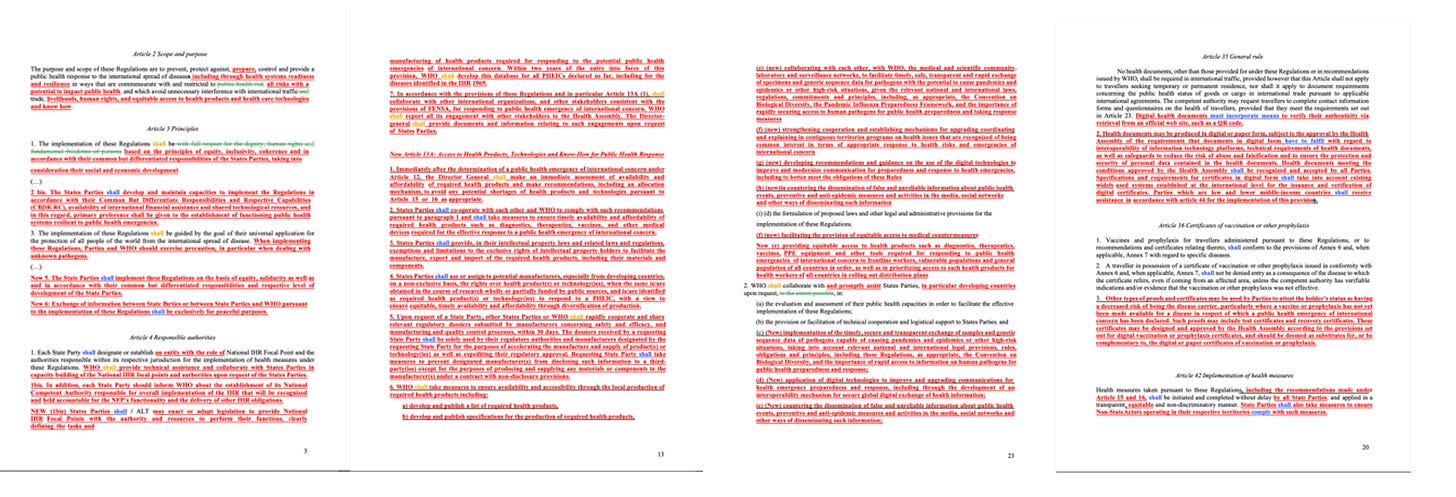If your amended rental agreement looked like this, wouldn't you want to read it?
What everyone should know about the amendments to the 2005 International Health Regulations
Amendments to the International Health Regulations (2005) and a WHO pandemic treaty/accord are currently being negotiated by the WHO, its member states and private stakeholders in relations with the supranational body for adoption by the World Health Assembly (WHA) in May 2024.
However, some of these changes could already be voted on this week at the 76th WHO meeting from 21-30th May 2023.
Below are excerpts from the 46-page WHO Compilation of proposed amendments to the 2005 International Health Regulations with changes highlighted in red.
It is significant to note that the IHR amendments require no additional ratification to pass. They can be adopted via simple majority vote in the World Health Assembly (WHA). Particularly given that the IHR document is so vastly different in its amended form to the original, it is hard to believe that official parliamentary ratification is not required, and that the public have at no time been informed or consulted about this process that has far-reaching consequences for our health and sovereignty.
Most people know nothing about it at all.
The newly released, World Council for Health in-depth policy brief showcases the most important IHR amendments that have been proposed as well as central parts of the pandemic treaty (WHO CA+) draft. It explains why they differ from previous approaches to global public health in a significant way and therefore require a swift, effective and robust response.
The proposed IHR Amendments to the International Health Regulations (2005) raise serious questions with regards to state sovereignty and the future of governance. They also encourage the stifling of dissent from official line and wider surveillance via a range of (digital) certificates. The proposals of greatest concern include but are not limited to:
an amendment to Article 3 which suggests the removal of the “full respect for the dignity, human rights and fundamental freedoms of persons” as an overarching principle of the IHR (2005),
amendments to Article 1, Article 42, Article 43 as well as the introduction of NEW Article 13A and NEW ANNEX 10 that in combination pose serious questions for state sovereignty per the WHO’s own International Health Regulations Review Committee,
amendments to Article 15 which significantly expand the powers of the unelected, unaccountable WHO Director-General (currently Tedros Adhanom Ghebreyesus),
amendments to Article 44 and ANNEX 1 which relate to the systematic countering of dissent from official line,
amendments to Article 23, Article 35, Article 36, ANNEX 3, ANNEX 6 and ANNEX 8 which relate to surveillance of compliance with centralised dictates via (digital) certificates, and
amendments to Article 44 which concern the sharing of pathogens.
The WHO Pandemic Treaty/Accord Zero Draft is a separate and complementary legally-binding treaty which, if adopted, would:
Cede undue authority over global public health to the WHO,
Create a new cost-intensive, undemocratic supranational bureaucracy,
Impose an ideological framework called ‘One Health’ for matters of global health, including support for gain-of-function research with pandemic potential pathogens (Article 9.8) and also encouraging a globally coordinated effort to counter public dissent (Article 17).
Create “platforms that promote findable, accessible, interoperable and reusable data [on hazardous pathogens] available to all Parties” – which would include dictatorships and state sponsors of terrorism, raising security concerns.
At no point have the world’s people been consulted as to their views on ceding undue authority or relinquishing any amount of sovereignty concerning public health responses to an unelected and unaccountable supranational entity. At no point have the world’s people been consulted with regards to a variety of other crucial topics dealt with by the IHR (2005) amendments and the pandemic treaty/accord.
WHO will decide the future of your health, freedoms and sovereignty?
I encourage you to download and read the amended IHR document guided by to the points above, to lobby your political representatives to reject the proposed IHR amendments of concern and articles of the pandemic treaty/accord outlined above, and raise awareness about this monopoly power grab as much as you can among your family and friends so that together we can say a resounding ‘No’ and STOP the WHO.
Cartoon borrowed from Anne Gibbons. You can find more of Anne’s fabulous work here: https://annecantstandit.substack.com/






I shared this. I feel a bit disheartened still, knowing most likely that the vote will go through regardless. They all know each other, they know their team members are working on this... as soon as they got the “go ahead” to start drafting the updates, the project was a shoo-in. The voting is just a formality. So what can we hope for? Well, maybe once this gets passes and people start to see and feel the ramifications, they will put pressure on their governments to withdraw from the WHO? How realistic would that be? I continue to share fervently and talk about this, so at the very least, when this passes because too many were too indifferent, they will remember in the back of their minds hearing something about it “before it was too late” and maybe this will change their behaviour in some beneficial way. Maybe. Can’t stop trying to inform people. Thanks, again, to Tess and WCH for getting this info out.
I think we need to start recognising "unlawful legislation" for what it is. It's a violation of Natural Law and as such, it is NULL and VOID.
I've been wondering for a while who oversees the activities of compromised lawmakers, i.e. our corrupted governments which are now passing legislation drafted by corporate lobbyists, rather than legislation that is beneficial for the people. The IHR have brought this problem into sharp focus. The globalists are using unlawful legislation to enact criminal policies which in turn coordinates the activities of their substantial "human resources" around the world.
In the English legal system, a jury would be in a position to reject such unlawful legislation, but only after a case was brought to court. We need a mechanism to reject unlawful legislation before it has been passed by whichever corrupt and self-proclaimed legislative body contrives to impose such criminal policies.
Who voted for the World Health Organisation? No-one!